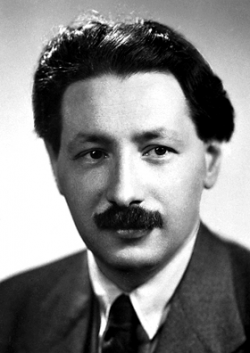Sir Ernst Chain

Sir Ernst Boris Chain
- Born
- 19 June 1906
- Died
- 12 August 1979 (age 73)
Ernst Boris Chain helped to found the field of antibiotics, beginning a new era in the fight against bacterial infections. His work remains one of the greatest contributions to human welfare.
Chain, a German Jew, was an accomplished biochemist and musician. A man of many talents, he often considered abandoning chemistry for the life of a concert pianist. Yet, it was perhaps the influence of his father, a chemist and industrialist, who had passed away when Chain was 13, that helped him stay the course and get a PhD in biochemistry and physiology.
After graduating, Germany was under the influence of the Nazi regime, and Chain realised he would no longer be safe. He came to England in 1933 while his mother and sister stayed behind. They would later perish in concentration camps.
By the time war broke out, Chain was working alongside Howard Florey, an Australian pharmacologist at Oxford University, to study the antibacterial substances produced by microorganisms, particularly penicillin. The discovery of penicillin, by Alexander Fleming in 1928, had been an important milestone in the history of medical research.
These antibiotic products had been discussed in scientific literature from as early as 1877 but so far, their potential for application had not been fully realised, as there was no clear way to cultivate the active ingredients into a usable form.
Chain was the driving force behind the first cultivation of penicillin. By controlling the temperature and pH of the fungi, Chain evaporated the mould broth which effectively ‘freeze dried’ the product. However, it was very slow work and took around 125 gallons of broth to produce enough penicillin for just one tablet.
In 1940, this concentrated form of penicillin was used in initial tests with laboratory mice to prove its lack of toxicity. The mice survived unharmed, and the next crucial stage of testing was to prove its effectiveness as an antibiotic drug. Mice were injected with lethal levels of streptococci bacteria and split into two groups. One group were inoculated with penicillin, while the other group were left untreated. The results for the drug’s effectiveness were positive and after further testing in mice, the team were spurred on to begin testing in humans.
Few scientists who, by the application of their science, have made a greater contribution to human welfare than Sir Ernst Chain
Chain, along with Florey and Fleming, was awarded the Nobel Prize for his contribution to the discovery and application of Penicillin in 1945.
Chain and his colleagues were not satisfied with their breakthrough, and even then were aware of antibiotic resistance. They began looking for possible alternatives, and their later research resulted in semisynthetic penicillins to overcome resistance.



